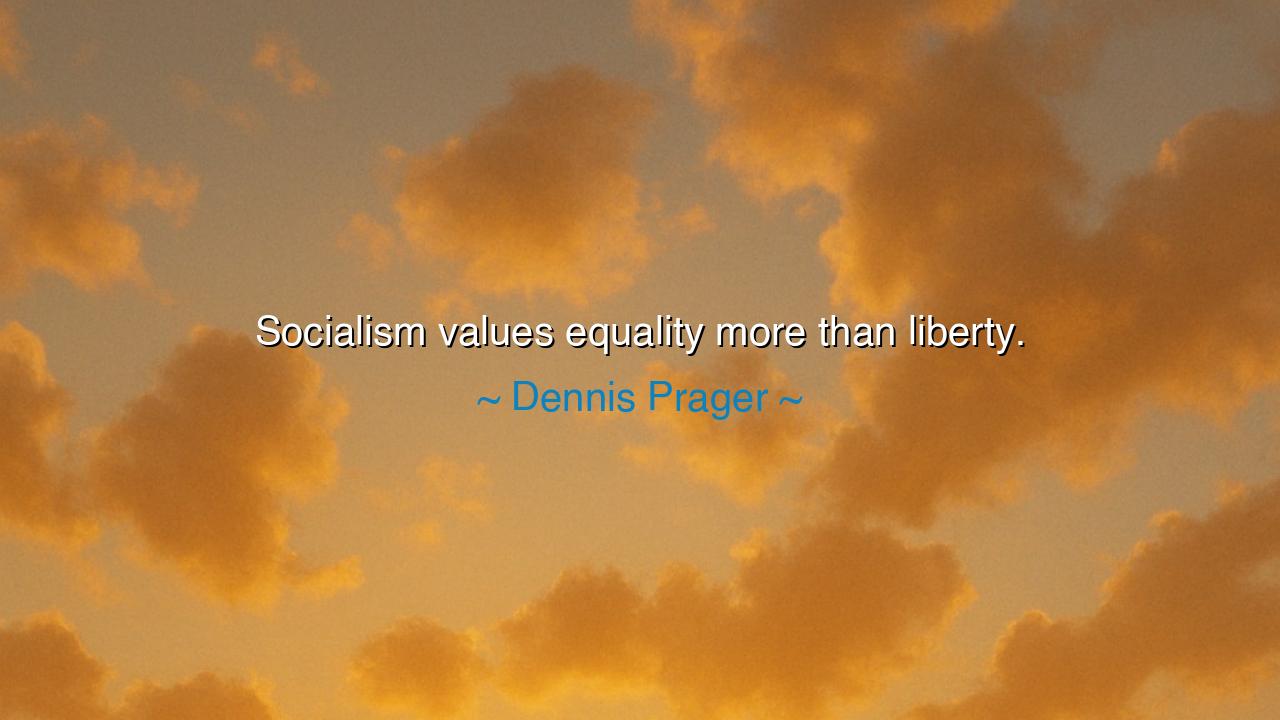
Socialism values equality more than liberty.






The American thinker and moral voice Dennis Prager once declared with clarity: “Socialism values equality more than liberty.” At first, these words may seem as dry philosophy, but within them lies a clash as old as politics itself: the contest between equality and liberty. Prager unveils the truth that in the vision of socialism, the highest good is not the freedom of each individual to rise or fall according to choice, but the leveling of all men to stand alike, shoulder to shoulder, regardless of their striving. Thus, in the socialist heart, equality eclipses freedom, and society becomes less about the soaring of the soul and more about the balancing of scales.
The meaning of this quote lies in the recognition that values often compete. Liberty allows one man to prosper while another lags behind; it honors the unpredictable fruit of talent, effort, and circumstance. Equality, in its strictest form, demands that none rise too high and none fall too low, even if liberty must be restrained to achieve it. Prager, therefore, reminds us that socialism, by design, places equality above liberty, believing that fairness of outcome is more noble than freedom of pursuit. This is no small choice—it determines the shape of laws, the direction of nations, and the destiny of peoples.
History bears witness. Consider the rise of the Soviet Union. In its earliest promise, it proclaimed equality for all—the worker, the peasant, the soldier. Yet to achieve this equality, liberty was strangled. Men and women could not speak freely, could not worship freely, could not pursue wealth or enterprise freely. For to allow liberty would be to allow inequality, and the dream of socialism could not endure such variance. Thus, though equality of condition was sought, the price was freedom itself, and what was gained in leveling was lost in human dignity.
Contrast this with the experiment of America at its founding. Its cry was not for equality of outcome but for liberty of opportunity: “life, liberty, and the pursuit of happiness.” Inequalities abounded—indeed, injustices scarred its birth—but liberty gave space for voices to rise, for chains to be broken, for wrongs to be confronted over time. This did not mean equality was absent, but rather that it was liberty which fertilized the soil from which greater equality could slowly grow. Thus, history shows us two roads: one where liberty is sacrificed for equality, and another where liberty, though imperfect, creates the possibility of equality.
The deeper wisdom of Prager’s words is that every society must ask: which do we cherish most, liberty or equality? To pursue liberty above all is to risk great divides between rich and poor, strong and weak. To pursue equality above all is to risk the death of freedom, creativity, and individuality. A balance is needed, but Prager warns that socialism tips the scale heavily toward equality, often forgetting that without liberty, equality becomes an empty shell, enforced by power rather than chosen by the heart.
The lesson for us is urgent. We must honor equality, yes, but never let it crush liberty. True justice is not sameness, but fairness; not enforced uniformity, but the freedom for each to strive. Equality must inspire compassion and protection for the vulnerable, but liberty must remain the breath that allows the human spirit to flourish. If we forget this, we risk building societies where all are equal, but equally unfree—where the price of sameness is the silence of the soul.
Practical wisdom flows from this: in our homes, our workplaces, and our nations, let us cherish liberty while pursuing fairness. Let us aid the weak without shackling the strong, protect the poor without punishing the industrious, and create opportunity without crushing creativity. For liberty and equality must walk together, but if one must lead, let it be liberty—for without it, equality becomes tyranny in disguise.
Thus, let the words of Dennis Prager endure as a caution and a guide: “Socialism values equality more than liberty.” May we weigh this truth carefully, remembering always that the flame of liberty, once extinguished in the name of equality, is not easily rekindled. And may we pass down to our children a world where freedom and fairness do not war with each other, but are woven together in wisdom.






AAdministratorAdministrator
Welcome, honored guests. Please leave a comment, we will respond soon